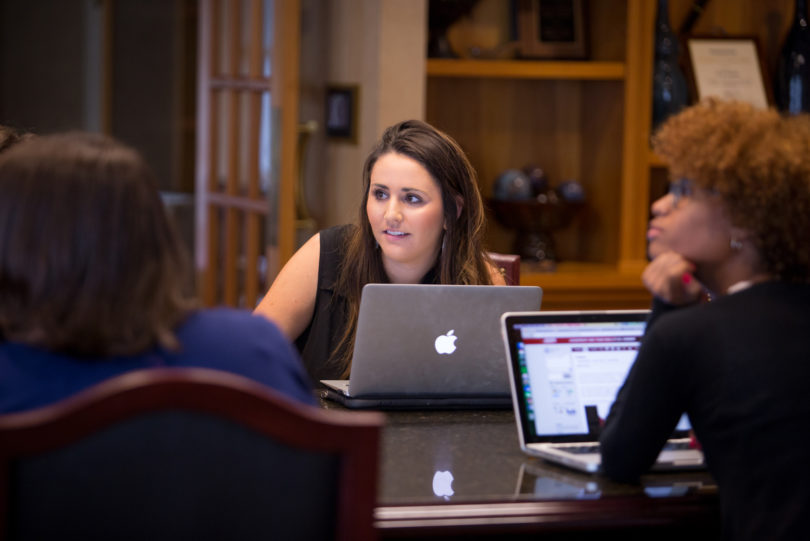Two years after she received her bachelor’s degree from the University of Georgia, Rachael Hart Earls was excited to return to her alma mater to begin her doctoral studies. But as she prepared for life in a laboratory as a neuroscientist, she worried that she would feel isolated and wondered if there was a way to create synergies between her academic goals and her desire to work with people outside of the lab.
She found the answer in Graduate Scholars LEAD (Leadership, Engagement and Development), a program launched this summer by the Graduate School. Funded by a $495,000 Innovations in Graduate Education grant from the National Science Foundation, the
program fosters the development of critical thinking skills, teamwork, communication and leadership.
“I was sold right away,” Earls said of the program, which includes an eight-week summer academy facilitated by faculty from the J. W. Fanning Institute for Leadership Development, College of Engineering, Grady College of Journalism and Mass Communication, and College of Veterinary Medicine. It also includes a follow-up grand challenges course, through which students are working this fall to design a meaningful solution for a community in need.
“I have always known that I have wanted to help others, but I only saw how to help others through my narrow lens,” Earls said. “Working with such a diverse group of doctoral students has broadened my horizons and allowed me to see bigger issues at hand.”
The challenge course is a critical part of the program, allowing the students to put their new skills into action as they work to understand the challenges faced by communities and learn best practices in community engagement. The theme for this year’s challenge is food, and the community partners include Barrow County’s public schools and housing authority and the Archway Partnership community of Griffin-Spalding County.
“Historically, most graduate students have been trainedto follow their mentors into academic positions,” said Graduate School Dean Suzanne Barbour. “GS LEAD provides students with a broader set of skills, designed to serve them in almost any career path.”
She notes that GS LEAD is one of several initiatives implemented in recent months with the goal of elevating graduate education at UGA. To further enhance graduate education, UGA is offering new highly competitive fellowships for master’s and doctoral students, offering funding to help faculty members grow their programs and providing resources to ensure that graduate students are successful during their time on campus and beyond.
The Graduate School has partnered with the UGA Writing Center to offer support to graduate students who are writing their thesis or dissertation. This July, the two units collaborated to offer a weeklong boot camp, which included group lessons and individual consultations.
To facilitate development of more programs to support students, the Graduate School has initiated two surveys: a professional development needs assessment for students (https://www.surveymonkey.com/r/ugagradpd) and a professional development inventory for faculty (https://www.surveymonkey.com/r/ugagradinventory).
The Graduate School will use results of the surveys to create new professional development opportunities for graduate students and professional development “menus” designed to help students make the most of their graduate and professional studies.





